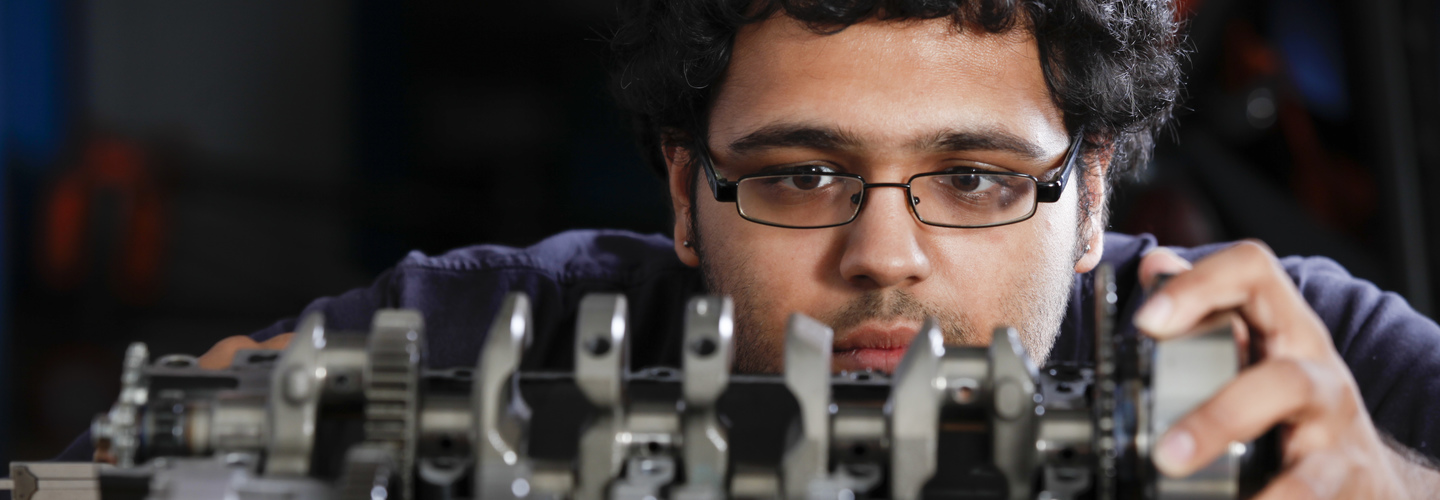BSc (Hons) Motorsport Technology
Key information
-
Typical offer:
Entry requirements -
Fees: See below
Full details -
UCAS code: H331
-
Institute code: H36
-
Study abroad option
-
Work placement option
Find out more
Why choose this course?
- 92% satisfaction for academic support (NSS, 2024, based on the average of Q15-16)
- Brand new School of Physics, Engineering and Computer Science building
- 10th in the UK for production and manufacturing engineering (Daily Mail University Guide, 2025)
The BSc (Hons) Motorsport Technology is part of a suite of automotive-related degree courses designed to equip students with the skills and knowledge needed for a career in motorsport and automotive engineering. From your first year, you’ll have the opportunity to participate in the prestigious Formula Student Competition, where you'll design, build, and race a single-seater race car. The programme is supported by excellent facilities in automotive engineering technology, and you’ll benefit from world-class expertise in key areas such as materials, vehicle dynamics, structural analysis, aerodynamics, and CAE (Computer-Aided Engineering).
Our students have gained valuable work experience during placements with renowned companies like VW Racing, Hyperion Motor Racing, and RP Aero Systems, while recent graduates have gone on to work with organisations including Mercedes-Benz, Vantage Engineering, and Bentley Motors. Entry to the course does not require an A-level in Mathematics or Physics; instead, we look for the right UCAS points and, most importantly, your passion for the subject.
We are also proud members of the CDIO Initiative (Conceive Design Implement Operate), a global network of academic professionals, industry leaders, and engineering experts. This initiative has been embedded into the motorsport technology degree programme, ensuring that you will gain hands-on experience through "Design and Build" projects, putting your learning into practice from day one.
What's the course about?
Excitement, international travel, and the opportunity to work in high-performing teams to achieve success are just a few of the major attractions of the motorsport industry. The motorsport technology degree will equip you with the skills to support motorsport engineers working at the cutting edge of automotive technology. You’ll benefit from world-class expertise and state-of-the-art facilities while studying a diverse range of modules, including vehicle and engine design fundamentals, advanced computer-aided design (CAD), and cutting-edge manufacturing techniques. Additionally, you’ll gain hands-on experience by collaborating with engineering students to design, build, and race a Formula Student race car.
Your main campus is College Lane
This is where the creative arts, science and health-related subjects are based. This means you’ll share the campus with future nurses, scientists, artists and more. You can use the common rooms to relax with friends, work out in the 24-hour gym or have a drink in our on-campus pub or cafes. We also have restaurants for you to eat in or grab something on the go. Our Learning Resources Centres are open 24/7, which means you can study whenever suits you best. Want to pop over to the other campus? You can take the free shuttle bus or walk there in just 15 minutes.
New School of Physics, Engineering and Computer Science building now open
Learn in our new state-of-the-art building called Spectra, where you’ll experience a range of experiential learning zones. You will have access to modelling, simulation and research labs, our Merlin Flight Simulator and automotive workshop (complete with electric vehicle facility), wind tunnel, welding bay and controls testing suite.
You will also benefit from our Academic Support Hub, which is aimed at helping you build your employability and academic skills. Plus, have access to industry mentors who will provide you with pastoral support, vocational guidance, and career progression opportunities.
Spectra also provides space to collaborate, with plenty of workshops, social and meeting spaces available. Even better, the building has been designed with the University’s net zero carbon target in mind, and forms part of our plan to replace or upgrade older sites that are energy inefficient.
What will I study?
The School has a reputation for innovation in teaching and learning with most modules delivered through a combination of traditional face to face teaching and distance learning through the university's StudyNet web based facility. StudyNet allows students to access electronic learning resources, electronic discussion with staff and other students, and, for some modules, submit coursework 24/7 from anywhere in the world! With a heavy emphasis on Computer Aided Engineering, the school has a policy of using industrial standard software wherever possible. The School also operate an open access laboratory policy of when possible students doing experiments in their own time.
More about the Course
Motorsport is not just exciting entertainment, it's also an important part of the development side of the automotive industry. The competitiveness of the sport drives engineers to develop innovative ideas and take advantage of up and coming technologies that, if successful, could be employed across the main automotive industry in future. The motorsport technology degree will give you the combination of skills necessary to support motorsport engineers as they strive for efficiency and optimum performance in their vehicle design.
First year
In your first year you will gain a good grounding in engineering, covering technology, information technology and management. You'll also be introduced to the fundamentals of vehicle design, covering engines, powertrain, body, steering, suspension and vehicle systems, and will study the structure of the automotive industry.
Second year
In Year 2, you will expand your knowledge of core technologies, IT, and business skills, applying them within the automotive sector. This includes studying vehicle design and the factors that influence it, as well as vehicle aerodynamics, including wind tunnel testing. You will also develop IT expertise in CAD and CAM, along with simulation and analysis techniques. You will also have the opportunity to contribute to the development of the Class 200 Formula Student car, building on the previous year's Formula Student entry
Final year
In your final year, you will focus on the application of motorsport technology. You will study automotive body engineering, chassis, powertrain technology, aerodynamics and engine design for motorsport, as well as the engineering aspects most closely associated with racing. A vehicle design project fosters team capabilities that employer's value, and you will have the chance to develop more specialist knowledge by exploring a topic that particularly interests you. There is also the opportunity to be involved with the development of the University's entry to the Formula Student competition.
Check out our student blogs
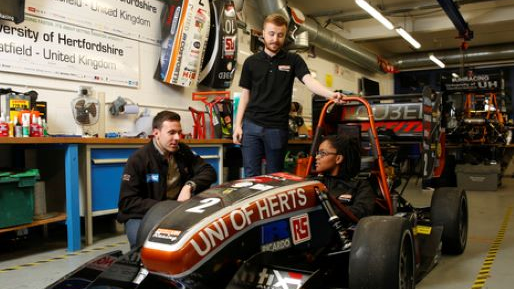
Student Blogs
Dobromir - Week at a glance
My week at a glance
Hello! This is what a typical week looks like for me as a student at the University of Hertfordshire!
At first, as a newly arrived second-year student, my week schedule was chaotic but trust me, once three or four weeks of the semester have passed you will have already got used to the pace and will have developed at least a basic schedule for your week, as I did. For me, it is all about the balance between university, part-time work, and social life.
Monday
On Mondays, as I have a part-time job, I usually go to work in the morning until lunch and then head back to university for two hours of face-to-face teaching in the early afternoon. After I finish lectures, I dedicate my late afternoon to revisiting lecture notes and working on assignments, sometimes ahead of their time, to avoid falling behind. My evening is usually spent in the gym and then resting.
Tuesday
Tuesdays are quite hectic for me, as I am out from 09:00 to 20:00. I spend the first half of my day at lectures and, after a short break in the afternoon, I head to work and stay there until 20:00. As you can expect, after such a long and exhausting day, all I can do when I’m back home is just to relax and get some good sleep.
Wednesday
My Wednesdays are flipped Mondays, since I go to lectures in the morning, refresh and then head to work, where I spend my afternoon. At evening time, I go through and catch up on lecture and tutorial notes, if I have missed something, and work on assignments. In Engineering, most projects require you to work in a group with other fellow students. The Learning Resource Centre (LRC) is where you will work on group projects as it is most convenient for gathering people. The environment is very relaxing and much of the time is spent chatting and having fun, so be ready to spend a substantial part of your time in the LRC!
Thursday
My whole Thursdays are spent at university as I have lectures from 09:00 to 18:00 and I am keen on attending all of them. Don’t get intimidated, there are regular breaks between lectures that give students more than enough time to refresh! As you can imagine, after my last lecture, I would rather do some exercise, so I will go to the gym and let go of excessive energy.
Friday
On Fridays, as my schedule is quite free, I take my time in the morning to meet up with fellow students and work on assignments. Getting through afternoon lectures is easy and feels like it happens instantaneously as everyone is excited about the end of the work week and wants to go out. And, as you can expect, that is exactly what happens on a Friday afternoon. I go out for a walk with friends, if the weather is nice, and in the evening, we go to a pub and celebrate the end of the work week.
Saturday
I value my free time and for that exact reason, I spend the first half of my Saturday studying and working on assignments. I avoid distractions, as the sooner, I finish, the sooner I will be able to go out and have fun. Afternoon time is usually spent shopping, going to a café with friends or at the gym
Sunday
My Sundays are almost identical to my Saturdays with the only difference that at evening I take 30 minutes, sometimes even less, to check my progress with my assignments, make sure I don’t miss any deadlines and plan out a schedule for the upcoming week. Then it is time for a good recharge before the week starts.
At first, all the things you must do as a student sound like a lot to handle, but, trust me, it will all come naturally, and you will eventually learn to handle your tasks with ease!
Things you need to know before studying Engineering at Herts
Preparation
When you arrive at university, you will be overwhelmed with many emotions: some students get excited about all the new people they are about to meet, others feel intimidated by the new environment. Regardless of how you feel, try not to compare university to anything you have experienced before. I have already gone through this stage and I can tell you that university life is differs a lot from anything I have experienced so far. If you feel nervous, know that you are not alone. You are on the same boat with more than 1500 other newly arrived students, so just open yourself up for this new opportunity and go out and speak to people. You won’t believe how easy it is to make friends, especially during Fresher’s Week and at The Forum.
Qualifications
Many people believe that you can only be a good Engineering student if you have taken A-Levels in Mathematics, but you will be pleased to hear that this is not true. I graduated from high school with a diploma in foreign languages and my knowledge in mathematics has always been average. Nevertheless, my performance in all mathematics and mathematics related modules in university has been excellent so far. The teaching staff is so good and there is so much support at uni, that you can rest assured you will receive the best help you can get if you struggle with studies.
Reading
As a student in engineering, you will not be required to read too many articles or books. Do not get me wrong, there will be a lot of work and you will really have to put effort into studying if you want to have good grades. For most of the time, you will be working on various software programs, you will spend a good portion of your time in laboratories and at the Learning Resource Centre (LRC) and you will also, depending on how good you are at maths, have to invest some or a lot of your time into solving exercises. Group projects are also an essential part of your experience at university.
Assignments
The nature of a job as an engineer in almost any company requires you to work well in a team. University is really good at preparing you for that and therefore most of your assignments will require you to work well in a team. Some people are naturally good at that, others, like me, are not that good at it, but you will learn fairly quickly. Be prepared to spend the majority of your time working on assignments with fellow students. The environment is really relaxing and, often times, working together is so fun that you don’t notice how time flies.
Assessments
In engineering, you will be assessed mostly through group or individual assignments, practical lab works and exams. The ways of assessing you are very similar to how your performance at a company will be assessed: some of them test your ability to work in a group and others test your performance under pressure. Either way, every type of assessment has benefits that will prepare you for a career as an engineer.
Time Management
Managing your time wisely is crucial for succeeding at university and later on in life. So, a piece of advice I could give to you would be to learn to regularly check your schedule and plan out your activities at least a week in advance. It’s very helpful that you can download the lecture timetable on your mobile device and easily keep track of your engagements and work other activities around them.

Student Blogs
Dobromir - Things you should know
Things you need to know before studying Engineering at Herts
Hello! I am a second-year student in Automotive Engineering with Motorsport and in this guide, I will give you the basics you need to know about before you start studying at university!
Preparation
When you arrive at university, you will be overwhelmed with many emotions: some students get excited about all the new people they are about to meet, others feel intimidated by the new environment. Regardless of how you feel, try not to compare university to anything you have experienced before. I have already gone through this stage and I can tell you that university life differs a lot from anything I have experienced so far. If you feel nervous, know that you are not alone. You are on the same boat with more than 1500 other newly arrived students, so just open yourself up for this new opportunity and go out and speak to people. You won’t believe how easy it is to make friends, especially during Fresher’s Week and at The Forum.
Qualifications
Many people believe that you can only be a good Engineering student if you have taken A-Levels in Mathematics, but you will be pleased to hear that this is not true. I graduated from high school with a diploma in foreign languages and my knowledge in mathematics has always been average. Nevertheless, my performance in all mathematics and mathematics-related modules in university has been excellent so far. The teaching staff is so good and there is so much support at university, that you can rest assured you will receive the best help you can get if you struggle with studies.
Reading
As a student in engineering, you will not be required to read too many articles or books. Do not get me wrong, there will be a lot of work and you will really have to put effort into studying if you want to have good grades. For most of the time, you will be working on various software programs, you will spend a good portion of your time in laboratories and at the Learning Resource Centre (LRC) and you will also, depending on how good you are at maths, have to invest some or a lot of your time into solving exercises. Group projects are also an essential part of your experience at university.
Assignments
The nature of a job as an engineer in almost any company requires you to work well in a team. University is really good at preparing you for that and therefore most of your assignments will require you to work well in a team. Some people are naturally good at that, others, like me, are not that good at it, but you will learn fairly quickly. Be prepared to spend the majority of your time working on assignments with fellow students. The environment is really relaxing and, often, working together is so fun that you don’t notice how time flies.
Assessments
In engineering, you will be assessed mostly through group or individual assignments, practical lab works and exams. The ways of assessing you are very similar to how your performance at a company will be assessed: some of them test your ability to work in a group and others test your performance under pressure. Either way, every type of assessment has benefits that will prepare you for a career as an engineer.
Time Management
Managing your time wisely is crucial for succeeding at university and later on in life. So, a piece of advice I could give to you would be to learn to regularly check your schedule and plan out your activities at least a week in advance. It’s very helpful that you can download the lecture timetable on your mobile device and easily keep track of your engagements and work other activities around them.

Student Blogs
Dobromir - Guide to the facilities
Guide to the Engineering facilities
Hello! This is my guide to all engineering facilities, how I use them and how you can benefit from them.
As an engineering student, you will spend most of your time on College Lane Campus, like lectures, tutorials, practical lab works, and assessments are all held at the School of Engineering and Technology. There are plenty of facilities available to you, however, speaking from personal experience, I can tell you that the one you will use the most will be the Learning Resource Centre (LRC).
Learning Resource Centres (LRCs)
Most of the modules will not require you to read too many articles or books other than the ones you already use in class. However, you will have a lot of assignments that consist of working on a project in a group with other fellow students. There is one LRC on College Lane Campus and another one on de Havilland Campus. Both LRCs have study rooms with projectors and desks, which make them very convenient for group gatherings. Both LRCs are identical, and you will use the one that is closer to your accommodation, regardless if it is on-campus or off-campus. If you, for any reason, wish to go to the LRC located further away from you, there is a shuttle bus that can take you from one campus to the other in less than five minutes. If the weather is nice and you wish to walk instead of taking the bus, it’ll take you less than 15 minutes to get from one campus to the other.
The LRCs have many computers, equipped with all software you use in class, and there are laptops for loan. There are study rooms you can book, especially useful for group gatherings, there are desks you can study at, or if you prefer silence, the last floor of each LRC is for silence study. If you study better at complete isolation, there are silent rooms, designed for just a single person (they are perfect if you don’t want to get distracted by anything). If you want to take a break, each library has a café, which offers a range of snacks, as well as coffee.
Online Library
If you prefer to stay home, instead of going to the LRC, the online library is a perfect option for you. You can access the University’s online library, where you can find any book that you can otherwise find at the LRC. Most books related to engineering have online copies available, so if you feel more comfortable studying at the comfort of your home, rest assured you can do so.
Support
During your studies at university, you can be sure that there will always be dedicated support at your disposal. As an engineering student, you will have several modules in mathematics and if that is something you struggle with, you can always use the Math’s support service, which is found at College Lane LRC. In addition to that, you can always speak to your lecturers in class or after class, or you can email or go to a drop-in session, if necessary. Same goes for all other modules as well, no lecturer will ever send you back. In fact, they may invite you to attend their drop-in session, where they will have a better opportunity to help you.
In terms of preparing yourself for starting and developing a successful career as an engineer, or if you want to get a part-time job, you will need to write a perfect CV (Curriculum Vitae) that will make you stand out from the others. For this purpose, you can use the Careers and employability service, where you will get advice and help from professionals in the branch. You can book a session, during which you will be able to discuss you CV and Cover Letter, if you wish to apply for a placement or a graduate scheme, and get advice on how to improve them.
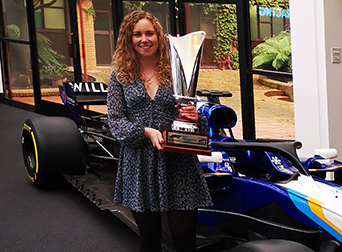
Alumni Stories
Katie Dobson
Meet Katie Dobson who is working for the Williams Formula 1 team
Read more stories MEng (Hons) Automotive Engineering with Motorsport| Current job role | Aerodynamic Design Engineer |
|---|---|
| Year of graduation | 2017 |
| Course of study | MEng (Hons) Automotive Engineering with Motorsport |
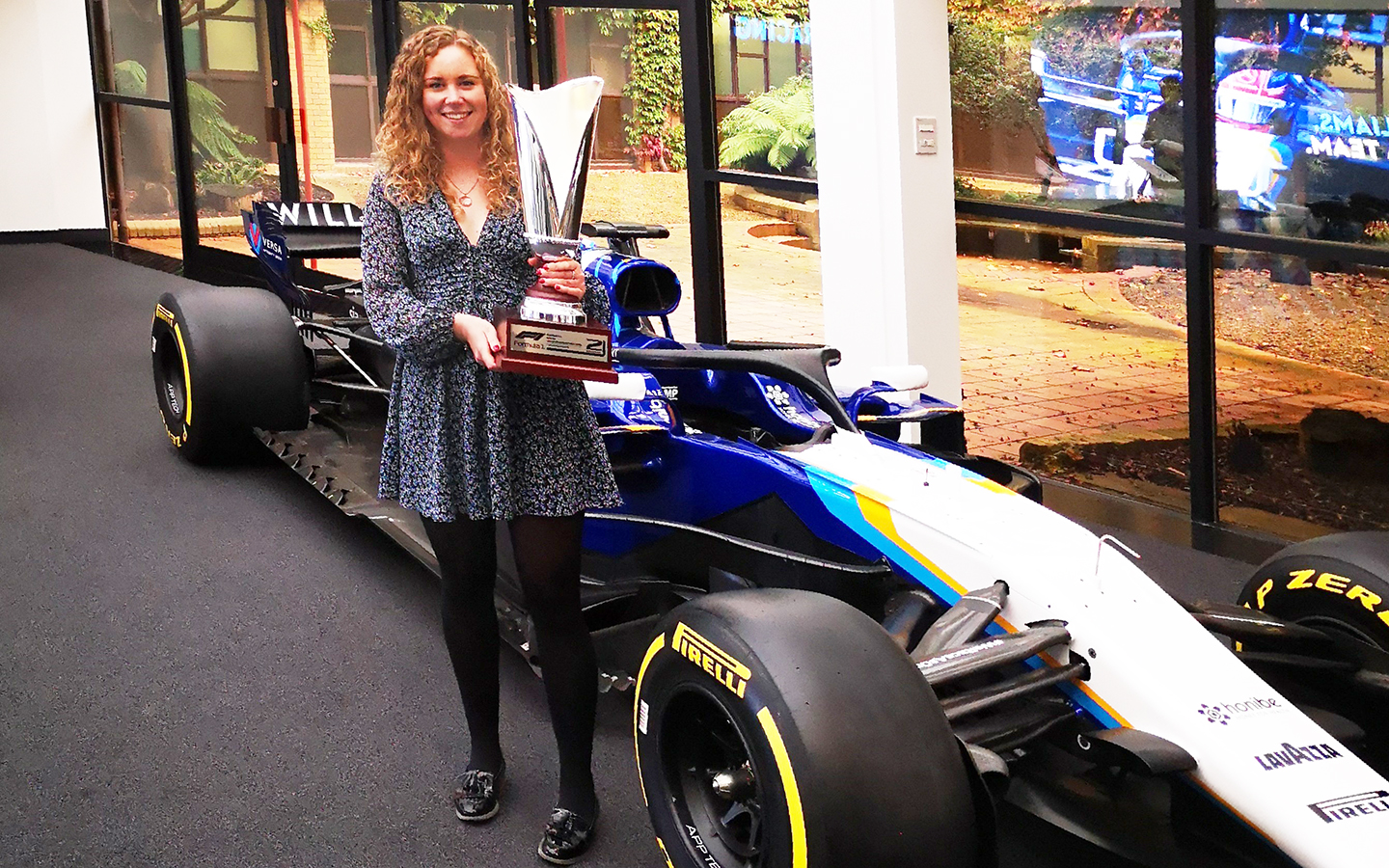
Katie knew that she wanted to pursue a career in Motor Sport and saw the course at Herts as the perfect pathway to follow her dream.
She is currently an Aerodynamic Design Engineer with the Williams Formula 1 team and explains a bit more about her role and what it entails, ‘I was lucky enough to join Williams F1 as a Junior Aerodynamic Design engineer after completing my MEng in Automotive Engineering with Motorsport at Herts.
My role involves designing mechanical and aerodynamic components for the wind tunnel. I lead the research and development for the wind tunnel front wing design and work closely with the aerodynamicists to improve design concepts and make wind tunnel tests as streamlined as possible.’
Working in Formula 1
Katie really enjoys the challenge of the role and the industry which is fast-paced on all fronts.
‘Working in Formula 1 is very enjoyable and very rewarding when you see results on the track. Seeing Williams back on the podium and scoring points again in 2021 were particular highlights.
I also enjoy the fast-paced environment and continual research and development required to keep up with technology and rules changes.’.
Why Herts
Katie chose to study at Herts because she was impressed with the large range of studies provided by the Engineering department and the range of facilities which provided crucial hands-on experience to work in industry. She adds, ‘I was particularly impressed with the extra-curricular groups and studies provided by Herts such as the Formula Student team.’
When she talks about the best part of her course she says, ‘It was being able to apply what I had learnt during my A-Levels to further my knowledge of engineering and the knowledge and enthusiasm my lecturers had to further my studies.'
Formula Student
Knowing that hands on practical experience is so important in the industry Katie became a member of the successful Formula Student team at Herts. She is certain that it helped when it came to her career and says, 'Participating in Formula Student particularly aided my ability to gain my current role in industry.
It was able to provide me with this expertise and allow me to broaden my field of study outside of the classroom or lecture hall.’
Favourite memories
Unsurprisingly Katie’s best memories revolve around her experience with the Formula Student Team and the success on and off the track.
‘My favourite memories at Herts were the times spent designing and manufacturing UH19 and UH20 with great friends. My favourite of them being completing at FSUK, FS Czech and FS Germany with the most successful UH FS car of all time as well as winning design at both the UK and Czech competitions.’
The future
Katie has set her sights high when it comes to the future and what it could bring. ‘My future plans are to advance my career further in motorsport, and to hopefully win a Drivers and Constructors Championship in F1.’
Find out more about the Formula Student Team
If you have a great story like Katie's, please contact us!
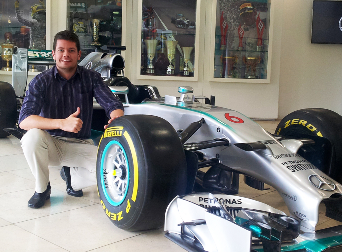
Alumni Stories
Lee Stretch
Meet Lee Stretch who has achieved great success in motorsport engineering since graduating in 2011. He currently works as a Vehicles Dynamic Engineer for Ferrari's Formula One team.
Read more stories MEng (Hons) Automotive Engineering with Motorsport| Current job role | Vehicles Dynamic Engineer |
|---|---|
| Year of graduation | 2011 |
| Course of study | MEng (Hons) Automotive Engineering with Motorsport |
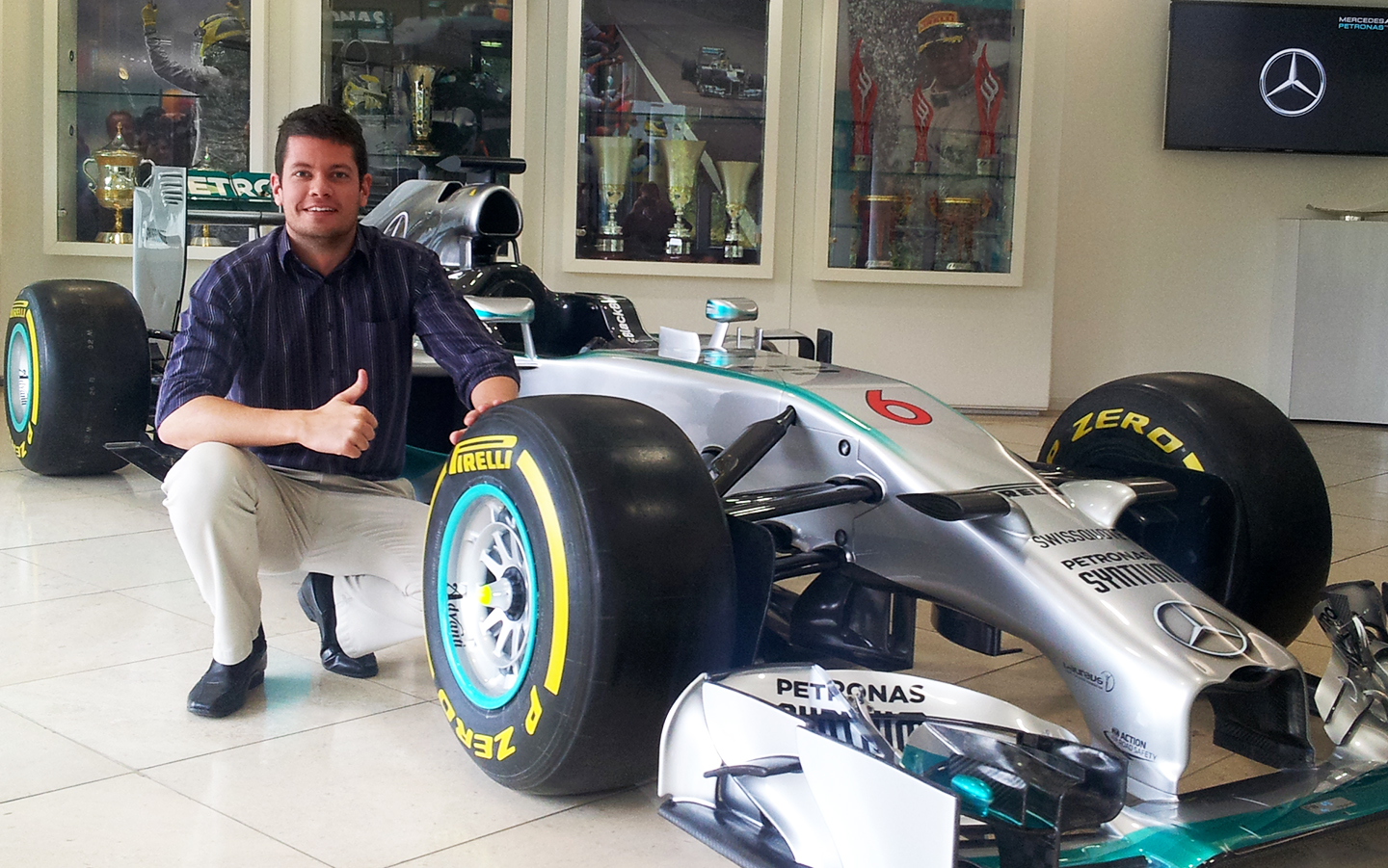
Facilities and experience
Lee made his decision to study at the University of Hertfordshire when he attended an open day, which included a visit to the Formula Student automotive workshop. 'The students had designed and built a single seat racing car which they raced against other universities. It blew me away!' His love of Formula Student became the catalyst for where he is today.
Lee felt the course itself was well rounded, covering all aspects of engineering, with a focus on design, which he enjoyed. Crucial moments of Lee's studies, from submitting his final year project, to designing a racing car in parallel with his full-time sandwich year job, taught him what is possible with determination, and a deadline.
This culminated in second place at Formula Student Germany - the best result ever for a UK team. 'Without these experiences, perhaps I wouldn't have had the guts to move to Italy.' He says, 'I've applied so many of the topics I studied at Herts to my career at Formula One. I regularly find myself reaching for my student notes from five years ago!'
Exciting career
After graduating, Lee worked with Mercedes GP as a Performance Simulation Engineer where he worked with some of the most sophisticated lap simulation tools in the industry. 'It was a very hard three years at Mercedes but equally rewarding, with the 2014 World Championship being the icing on the cake.'
Lee's passion and commitment was recognised by the only other team that he would have considered moving to - Ferrari. Lee moved to Italy and spent time learning Italian. After only six months in the role, he had contributed to the next year's cooling system, and developed the team's lap simulation tools.
Despite working in a relatively specialised group of vehicle performance, Lee's role demanded sound mechanical understanding, thermodynamics, practical design considerations and even pure mathematics in simulation. 'Communication is paramount, so all the report writing, presentation and team working skills necessary in the final two years of my degree have proved hugely beneficial.'
Since then, Lee has decided he wants to explore something new. He says, ‘Haas F1 offered me an opportunity to lead an Advanced Simulation team, harnessing my experience to expand the capabilities of their Vehicle Science Group. I'm now creating specialised tools for studying car performance and being fully prepared for the new 2026 regulations.’
